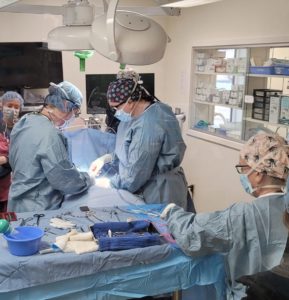Surgery
At Portland Veterinary Emergency and Specialty Care, our board-certified surgeons have received four additional years of training in anesthesia, soft tissue, orthopedic and neurologic procedures. We perform advanced oncologic and reconstructive surgeries as well as advanced orthopedic procedures such as fracture repair, TPLO & TTA for cruciate ligament stabilization, Total Hip Replacement surgery, arthroscopic surgery, and many more.
Our state-of-the-art surgery suites are equipped with modern anesthesia machines, heated surgery tables, and patient monitoring devices. Our surgeons specialize in soft tissue and orthopedic surgeries. Therefore many Maine veterinarians refer more complicated procedures to our surgeons.

WHAT IS A VETERINARY SURGICAL SPECIALIST?
Many pet owners are unaware of specialization in veterinary medicine although they are quite familiar with it in human medicine. A specialist in veterinary medicine is quite similar to their human counterpart. Both have gone through additional years of study and training to dedicate themselves to their chosen area. As the human physician will refer patients to a surgeon for complicated procedures, veterinary practitioners refer surgical cases to a veterinary surgeon.
The American College of Veterinary Surgeons (ACVS) was formed to acknowledge and regulate the training and certification of veterinary surgeons. To achieve Diplomate status in the ACVS, a veterinarian must complete at least four years (one year of internship and three of a surgical residency) in a program accredited by the ACVS. Upon completion of the residency, the candidate must submit credentials to the ACVS for review.
The credentials document the individual’s training including all the surgeries they have performed, the Diplomate who supervised them, all classwork done, lectures given, and scientific papers published. Once these credentials are accepted, then they are invited to sit for the certifying exam. This is a two-day exam consisting of oral, written, and practical portions. Only upon successful completion of all three parts do they attain the status of Diplomate in the American College of Veterinary Surgeons. This is a rigorous and time-consuming process that ensures that those achieving Diplomate status are fully qualified to perform any and all types of specialized surgery that your pet may require. Small animal surgery is typically divided into three areas: orthopedics, soft tissue, and neurosurgery.